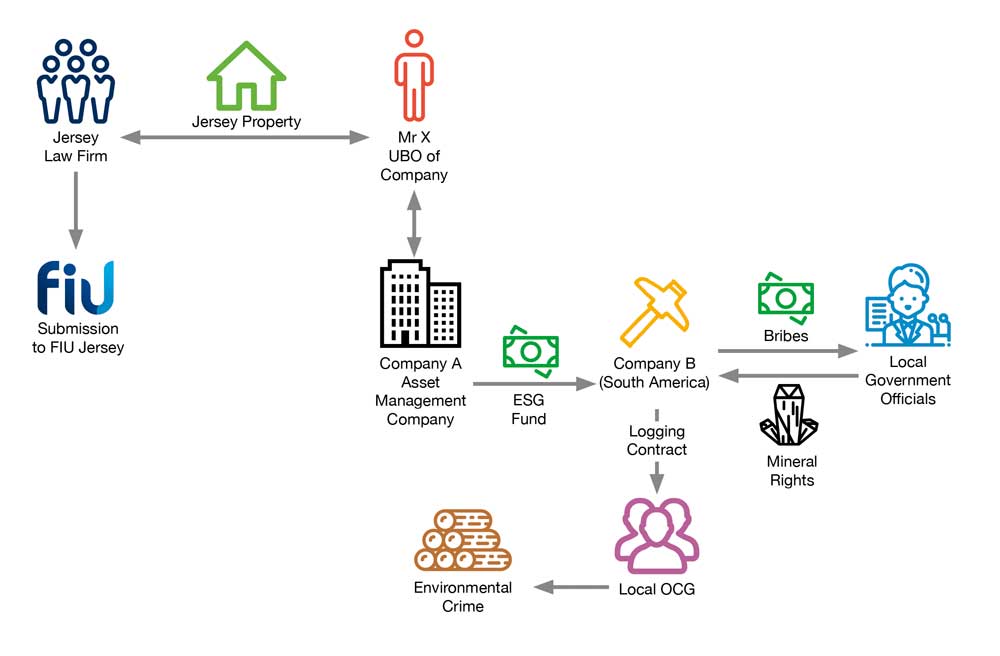During their onboarding process, a Jersey law firm has identified adverse media reports while conducting due diligence on a potential new client. Mr X is the Ultimate Beneficial Owner (UBO) of an asset management company (Company A) in a well-regulated and understood jurisdiction. Mr X has approached the law firm for legal advice regarding the acquisition of a Jersey property under the high-value residency scheme.
Mr X is neither a national of, nor a resident in, a high-risk jurisdiction. The bank statement provided by Mr X for verification purposes is from a regulated bank in an “equivalent” jurisdiction. Mr X indicated that his Source of Wealth (SoW) is from inheritance, salary, savings and investments.
Mr X has been evasive when asked to provide information or documents to corroborate his SoW/Source of Funds (SoF). Several follow-up calls and email requests have been ignored. When contact was finally established, Mr X confirmed that he would send all the relevant documentation, but to date, this has not been provided.
Open-source research identified that Mr X is regularly photographed with people in positions of influence, including Politically Exposed Persons (PEPs). There are no relevant matches for Mr X on World-Check.

Environmental crime refers to a wide range of illegal activities that harm the environment or violate laws designed to protect environmental resources. This includes actions such as illegal dumping of hazardous waste, poaching of protected species, deforestation, pollution of air and water, and violation of wildlife protection laws. These activities not only threaten ecosystems and biodiversity but can also have serious health impacts on humans and contribute to climate change. Efforts to combat environmental crime involve stricter regulations, enforcement actions, and international cooperation to protect natural resources and promote sustainability.
Bribery is the act of offering, giving, receiving, or soliciting something of value as a means to influence the actions of an individual in a position of authority. This can involve cash payments, gifts, services, or other forms of compensation. It typically occurs in situations where the recipient is expected to provide a benefit in return, such as favorable treatment, contracts, or legal judgments.
Bribery is prevalent in many spheres, including politics, business, and various levels of government. It distorts free markets and can lead to situations where decisions are made based on personal gain rather than merit or public interest. The consequences of bribery can be profound, leading to unfair advantages, damaged reputations, and legal ramifications for both the giver and receiver.
Corruption encompasses a broader range of unethical behaviors that abuse positions of power for personal gain. While bribery is one form of corruption, it also includes practices such as nepotism (favoring relatives or friends by giving them jobs), cronyism (favoring friends or associates in political or business decisions), fraud, embezzlement, and the manipulation of regulations to benefit oneself at the expense of the greater good.
Corruption can occur in both the public and private sectors and often leads to severe societal consequences, including the erosion of trust in institutions, increased inequality, and stagnated economic growth. When officials engage in corrupt behavior, it can hinder the effectiveness of government functions, resulting in poorer quality public services and infrastructure. Additionally, corruption can deter foreign investment, increase risks in business operations, and perpetuate cycles of poverty and disenfranchisement in communities.
Both bribery and corruption are detrimental to society and necessitate robust legal frameworks and ethical standards to combat their prevalence and restore integrity in institutions.
We continually strive to enhance the quality of the products we produce, from our typologies to reports, Insight papers to training guides. However, we can only improve if you share your feedback with us about what you think about them. This is your chance to let us know and we appreciate it your feedback. Click the navy button below or scan the QR code.
Tell us what you think >.svg)